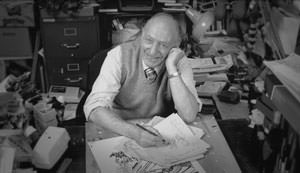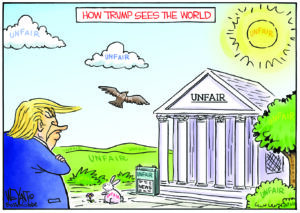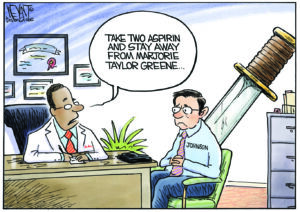Get ‘Herblock’ Before It’s Gone
Aug 26, 2013
We quickly learn in “Herblock: The Black & the White” that the legendary political cartoonist of The Washington Post never married, never learned to drive a car and generally ate both lunch and dinner in the Post’s cafeteria. It doesn’t sound like much of a life, except that for something like 50 years, this mild-mannered man was the most revered and powerful editorial cartoonist in the nation (his only real competition was the Los Angeles Times’ Paul Conrad, who, like Herbert Block — to call him by his rightful name — also won three Pulitzer Prizes in roughly the same time span).
I’m inclined to cut Michael Stevens, the director of this documentary, some slack for the problematic aspects of his film, which we’ll get to in a minute. That’s because Herblock was one of the heroes of my youth. He was not the only opponent of Joe McCarthy (as the film somewhat implies), but he was possibly the bravest of them, needling, needling, needling this wretched man, when many simply chose to remain silent. He was an old-fashioned liberal out of Chicago, not so much an ideologue as a guy with an acute sense of fair play, which McCarthy offended with virtually every breath he drew. His style was a true extension of the man, clear and brisk, not a lot of hard-breathing in it. Couldn’t afford it, in that for decades he was obliged to furnish five cartoons a week to the Post, which gave his work a pleasing, tossed-off quality. We had the sense that good instinct was always harnessed to a sure, quick hand, applied to all the blowhards in the District of Columbia, of whom there is never a short supply. Withal, this documentary shows him to have been a modest and rather cheerful man, who every afternoon stalked the city room with a few sketched-out ideas, seeking opinions about what worked best from the other inky wretches toiling there.
He seems to have had a quiet confidence, not particularly eager to force his favorites on those he consulted, apparently hiding his hand about the ideas he favored. He was, dammit, a very likable guy. Which, curiously, presents some problems for director Stevens. He has recruited to his film what seems to be every important political pontificator of Herblock’s era and with just one mild exception, they have nothing but good to say about him. Less would perhaps have been more in this realm. I hate to say it, but I’d like to have seen a few right-wing crazies attempt to puncture the man’s saintliness — not that I think they would have succeeded in any significant way.
Stevens is, however, working under quite a large handicap. Herbert Block died more than a dozen years ago, leaving behind very little significant footage. An actor impersonates him in much of the film — very successfully it seems to me. You could not have made this documentary without that subterfuge, and we are given to understand that virtually everything he says in the film is drawn directly from his own writings, all of which seem to me invaluable and as apt as they were so many decades ago.
There is one thing that the movie mentions, more or less in passing, at its end. Block died an incredibly rich man. He left an estate north of $60 million. Yes, you heard that right — $60 million at least. It seems that fairly early in his career, Block was one of a number of Post stars who were offered shares of its then-minimally valuable stock. He said “sure,” but since he had no need of the dough (remember, this is a guy who didn’t have a car — though he did have a boat and a long-standing lady friend), he just let it pile up and as the Post prospered so did he. In some way that seems to be the most astonishing thing about him: Herblock was more of a plutocrat than many of the plutocrats he skewered. It appears that he always had in mind establishing some sort of foundation with his legacy, something that encouraged journalism of the kind he had practiced. This was done. And there was not an empty seat at his memorial service at the National Cathedral.
There were, however, plenty of them at the showing I attended the day “Herblock” opened in Los Angeles. I was the only customer in a theater that could have held two or three hundred more. It’s not a great film, by any means, but it is a valuable one, in that it makes you reflect on the virtues of telling truth to power and not letting that increasingly rare ability go to your head. I don’t suppose this movie will be readily available for very long. You had better seek it out as soon as you can.
You may also like





